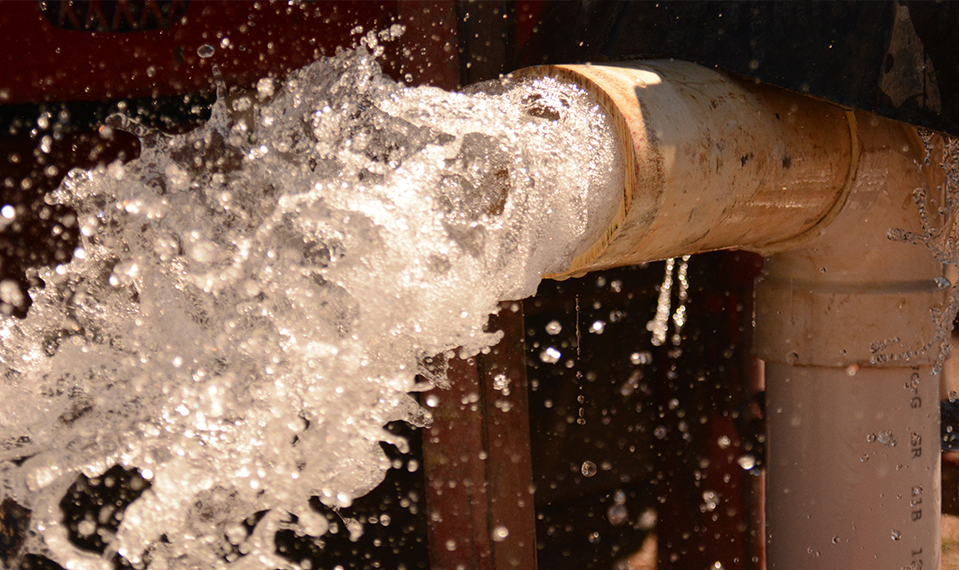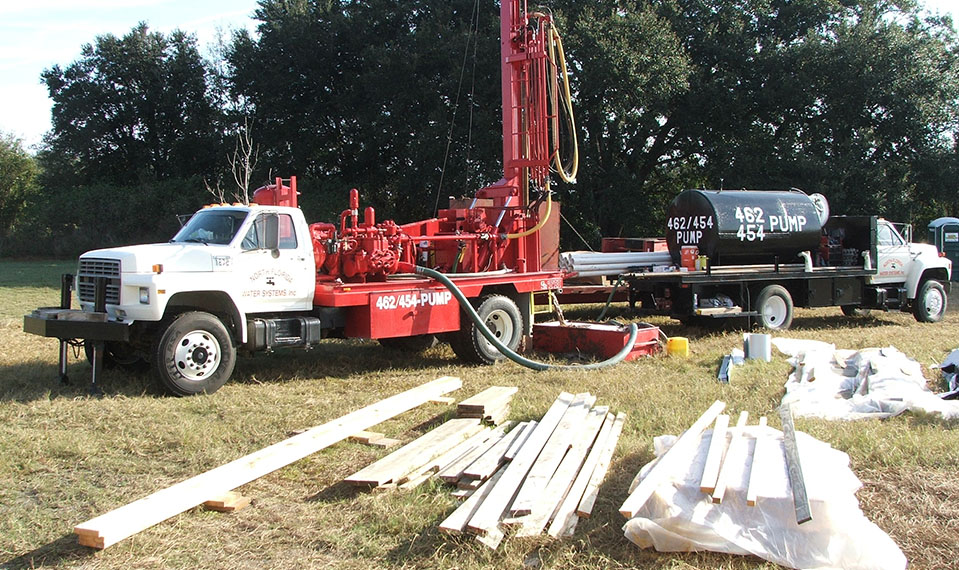Water Testing & Treatment
Comprehensive Florida Water Treatments, Including Well Water Testing, Whole House Water Filters & Water Softeners
Whether your drinking water comes from a well or a public water supply, at North Florida Water Systems Inc, we strive to achieve the highest water quality from that system. With years of experience providing water treatments in Alachua, Chiefland, Gainesville, Lake City, Newberry, Fort White, Trenton, and High Springs, we understand the most common Florida water problems and how to solve them. From water testing to purification, we have solutions for every water system. So if you’re ready to save money on bottled water by making every sip of water at your home or business is as crisp, pure, and refreshing as possible, contact our water treatment company in Florida to find a treatment that fits your needs.


Water Treatment Systems
Eighty percent of Floridians use public water systems. Yet, the quality of municipal water supplies, many people may be surprised to learn, aren’t always as high as they could be. Although public drinking water is tested and treated, these steps are taken only to meet minimum federal Safe Water Drinking Act standards. In other words, trace amounts of chemicals, minerals, and other contaminants could still be present. The 20 percent of (mostly rural) residents who use private wells can also encounter water quality issues due to poorly installed or damaged wells. That’s why well owners should schedule well maintenance and well water testing annually.
At North Florida Water Systems Inc, we offer a wide range of water treatment systems to address all water problems for wells and public water supplies. First, we test the water, and then based on the results, we create a solution that improves the quality and taste.
Well Water Testing
In addition to well drilling and pump repair, we also offer planned maintenance to help well owners avoid costly repairs down the road. During maintenance visits, we can incorporate water well testing and treatment services. In general, it’s recommended you schedule water testing in Florida at least once a year and track any changes over time. In many cases, water well treatment involves no more than adding water filters for well pumps, but in severe cases, the well casings could be eroded, especially if they’re metal, and PVC replacements may be needed.
Water Filter
A whole house water filter connects to the main water supply in a home or business. In contrast to store-bought filters, our water filters purify the water supply throughout the household, ensuring every drop from the kitchen sink, bathroom shower, or lawn sprinkler is virtually free of heavy metals, such as lead, volatile organic chemicals (VOCs), and chlorine. Meanwhile, home chefs often discover using filtered water creates nicer flavors for mouth-watering meals.
Water Softener
“Hard” water is water with a high mineral content, typically at least 60mg of dissolved calcium, magnesium, bicarbonate, or sulfate. While these minerals aren’t inherently dangerous for humans, they can damage your home’s plumbing system by creating mineral deposits that create scaling on faucets and blockages in pipes. We recommend a whole house water softener, which eliminates unwanted minerals through an efficient soft water system.
Is Your Drinking Water Safe?
Ideally, your water should have little to no taste or smell. If you detect a strong flavor or odor, that could indicate contamination, in which case the water should be tested to make sure it’s safe for drinking and treated if not. In Florida, we’re fortunate to have a plentiful supply of groundwater — more than 90 percent of the state’s water for drinking, bathing, laundry, agriculture, and other purposes comes from groundwater wells. Much of the country rely on surface water for drinking water, but Floridians can simply tap into the aquifers below their feet. A benefit of groundwater is that, as it seeps into the earth, it’s filtered by sediment layers. However, simply because groundwater is purified naturally doesn’t mean it’s not also vulnerable to contamination. That’s why it’s important to check the water’s quality before drinking it.
Common Florida Water Problems
Organic contamination from bacteria in Florida water is a serious health concern, according to the Florida Department of Health (FDOH). Bacteria usually originate from septic tanks and livestock and penetrates groundwater through corroded or poorly installed wells. Health risks from bacterial contamination can include illness and infection, while so-called “flesh-eating bacteria” can restrict blood circulation and cause tissue damage. Other organic and inorganic contamination may consist of chemicals leaked from fuel tanks, waste areas, or fertilized crops after heavy rain, while minerals and sediment can also contaminate well water. Considering these potential water quality issues, it’s important to schedule routine water testing in Florida to be reassured that your drinking water is safe year after year.
What Are The Benefits Of Water Treatment Systems?
Water treatment systems are admired mainly for the ways they improve the taste and health benefits of water. But adding a treatment system to your home or business can also raise its property value with future buyers. A water filter can also eliminate the need for buying bottled water and store-bought filters that only serve part of the household, while a water softener can extend the life of your plumbing system and water heater.
Water quality varies by region. That’s why when you’re looking for water treatment companies in Florida, choose one that not only has years of experience serving your area but also offers a range of treatment systems. At North Florida Water Systems Inc, our services include whole house water softener and water filter installations as well as water testing and water treatments for wells all across North Central Florida. Contact us to schedule a water test and learn how we can help make your water crisper, cleaner, and purer for years to come.
Water Treatment FAQs
Should My Water Be Tested?
Water from any source can contain microscopic organisms and pollutants that can end up making your family sick. A water test alerts you to potential dangers and helps our technicians identify exactly what type of water filtration system is best for your home.
How Often Should My Water Be Tested?
As a basic rule, you should test your water at least once a year to ensure that there are no issues with your filtration system and that no new contaminants are getting through. However, depending on your water source, we may recommend that you test your water more frequently to stay informed on the quality of the water. Our technicians will work with you to determine the best course of action.
What Causes Hard Water?
Hard water is caused by minerals, mostly calcium and magnesium, entering the water supply. This is typically a result of groundwater flowing over or through limestone. These minerals can build up over time in your pipes and appliances, causing issues like clogged pipes or appliance deterioration. Adding the appropriate amount of softening agents into your water system can help get your water back to normal.
How Do I Know If I Have Hard Water?
Examine appliances and fixtures such as the dishwasher, washing machine, faucets, sinks, and tubs for a white-colored scale that doesn’t wipe away easily. Try checking your soap’s ability to lather as well. If your soap bar doesn’t foam up but gets soft instead, you probably have hard water. Hard water will also leave rust stains in sinks, toilets, and tubs. You may even notice that your clothes are looking dingier after each wash because hard water limits a detergent’s effectiveness.
How Do Water Softeners Work?
A water softener introduces negatively charged sodium into the water, which binds to the positively charged minerals that cause hard water, nullifying their effect on your water.
How Does Reverse Osmosis Water Filtration Work?
Reverse osmosis systems can create some of the freshest tasting water by filtering out 92% of all contaminants. The system accomplishes this by forcing water from a high-pressure into a low-pressure chamber where the water passes through a semi-permeable membrane. The membrane catches contaminants while the clean water flows through.
Is Well Water Safe?
Whether you’re getting water from a public or private well, drinking well water can expose your family to chemicals, bacteria, and potentially dangerous elements such as arsenic, manganese, and uranium. And what’s worse, these contaminants can vary in concentration at different times, making it difficult to know what you’re drinking. We suggest that any home on a well water system invest in a filtration system for their families’ health.